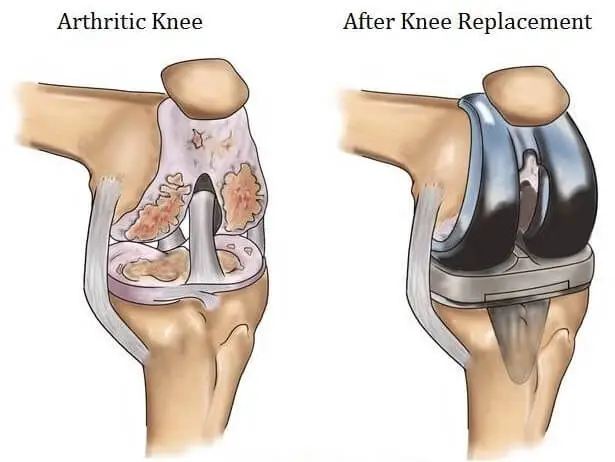Knee replacement cost in India
Types and cost of Knee replacement surgery in India
Knee replacement surgery in India has gained global recognition for its high-quality care, state-of-the-art technology, and affordability. This write-up will guide you through the types of knee replacement surgeries, the different types of implants used, the average cost across various Indian cities, and the best private hospitals for knee replacement surgery.
Types of Knee Replacement Surgeries
- Total Knee Replacement (TKR)
- Replaces the entire knee joint with an artificial implant.
- Provides significant pain relief and improved mobility.
- Longer recovery period compared to partial replacement.
- Partial Knee Replacement (PKR)
- Replaces only the damaged part of the knee.
- Shorter recovery time and less invasive.
- May not be suitable for patients with extensive knee damage
- Revision Knee Replacement
- Replaces or repairs a previous knee replacement.
- Addresses issues with earlier implants.
- More complex and may have a longer recovery period.
- Minimally Invasive Knee Replacement
- Uses smaller incisions to perform knee replacement.
- Reduced recovery time and less postoperative pain.
- Requires a skilled surgeon and may not be suitable for all patients.

- Metal on Plastic
- Metal femoral component and plastic tibial component.
- Durable, cost-effective, and widely used.
- Wear and tear over time can lead to inflammation.
- Ceramic on Plastic
- Ceramic femoral component and plastic tibial component.
- Less wear and tear, reduced inflammation risk.
- More expensive and risk of ceramic component fracture.
- Ceramic on Ceramic
- Both femoral and tibial components are ceramic.
- Excellent wear resistance, low friction.
- Most expensive, risk of ceramic fracture.
- Metal on Metal
- Both components are metal.
- Durable and less wear.
- Risk of metal ions release, causing potential health issues.
| Surgery Type | Mumbai | Delhi | Bangalore | Chennai | Hyderabad | Kolkata | Pune | Ahmedabad | Jaipur | Chandigarh |
|---|---|---|---|---|---|---|---|---|---|---|
| Unilateral Knee Replacement | 3,500 | 3,000 | 3,100 | 3,200 | 2,400 | 2,900 | 3,300 | 2,800 | 2,600 | 3,000 |
| Bilateral Knee Replacement | 6,500 | 5,800 | 6,500 | 6,200 | 5,000 | 5,500 | 6,300 | 5,900 | 5,200 | 6,000 |
| Partial Knee Replacement | 3,300 | 2,800 | 3,000 | 3,100 | 2,400 | 2,700 | 3,100 | 2,800 | 2,500 | 3,000 |
| Total Knee Replacement | 4,400 | 3,300 | 4,000 | 3,600 | 3,000 | 3,200 | 3,900 | 3,500 | 3,100 | 3,500 |
Best private hospitals for Knee Replacement surgery in India
- Medanta – The Medicity, Gurgaon
- Known for advanced robotic surgery and comprehensive care.
- Fortis Hospital, Bangalore
- Renowned for its specialized orthopedic center and rehabilitation services.
- Apollo Hospitals, Chennai
- Offers robotic-assisted joint replacement and computer-navigated surgeries.
- Kokilaben Dhirubhai Ambani Hospital, Mumbai
- Equipped with cutting-edge technology and expert orthopedic surgeons.
- Artemis Hospital, Gurgaon
- Specializes in robotic and computer-assisted orthopedic surgeries.
- Max Super Specialty Hospital, New Delhi
- Provides advanced joint replacement programs with high success rates.
- BLK Super Specialty Hospital, New Delhi
- Offers comprehensive joint replacement and rehabilitation services.
- Manipal Hospital, Bangalore
- Known for its multidisciplinary approach to orthopedic care.
- Narayana Health, Bangalore
- Provides affordable and high-quality orthopedic treatments.
- Wockhardt Hospitals, Mumbai
- Offers advanced surgical suites and comprehensive rehabilitation services.
Post-Surgery Care After Knee Replacement
Post-surgery care is crucial for a successful recovery following knee replacement surgery. Here’s a brief overview of what to expect and how to ensure optimal healing:
Hospital Stay and Initial Recovery
- Duration: Typically, patients stay in the hospital for 3-5 days post-surgery.
- Pain Management: Medications will be prescribed to manage pain and reduce inflammation.
- Physical Therapy: Early mobilization with the help of a physical therapist begins within 24 hours after surgery to encourage blood flow and prevent stiffness.
Home Care and Rehabilitation
- Mobility Aids: Use of walkers, crutches, or canes to assist with walking and prevent falls.
- Exercise: Adherence to a prescribed exercise regimen to strengthen the muscles around the knee and improve flexibility.
- Incision Care: Keeping the surgical site clean and dry, and monitoring for any signs of infection, such as redness, swelling, or discharge.
Pain and Swelling Management
- Continuing prescribed pain relief and anti-inflammatory medications as directed.
- Applying ice packs to reduce swelling and discomfort.
- Keeping the leg elevated when resting to help reduce swelling.
Lifestyle Adjustments
- Maintaining a healthy diet to support recovery and overall health.
- Gradually increasing activity levels as advised by the healthcare team, avoiding high-impact activities until fully healed.
- Maintaining a healthy weight to reduce stress on the knee joint.